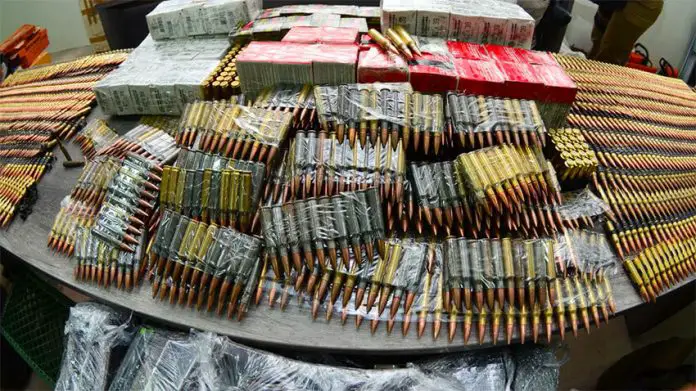The suspect in last month’s murder of two elderly priests controlled the beer market in some Sierra Tarahumara communities, Chihuahua authorities said after seizing almost 50,000 cans of the beverage.
José Noriel “El Chueco” Portillo Gil – the 30-year-old presumed leader of a Sinaloa Cartel-affiliated criminal cell called Gente Nueva (New People) – is currently on the run after allegedly murdering two Jesuit priests, a tour guide and a 22-year-old man in Urique on June 20. He is also believed responsible for the murder of a U.S. citizen in 2018.
Chihuahua authorities earlier this month established that Portillo’s complicity with municipal police allowed him to seize criminal control of a significant part of the state’s Sierra Tarahumara region. They now say that his influence extended to the distribution of beer in communities in Urique, located in southwestern Chihuahua near the border with Sinaloa and Sonora.
State Security Minister Gilberto Loya told the newspaper Milenio that “clandestine” beer sales helped finance El Chueco’s criminal group, while Attorney General Roberto Fierro Duarte said his monopolization of that market in some towns was indicative of the criminal power he obtained.
During a joint operation, the army, National Guard and state police recently discovered a warehouse in Bahuichivo – a small Sierra Tarahumara town where Portillo owns a luxury home – where over 2,000 trays of beer that allegedly belonged to Portillo were stored. The authorities seized a total of 49,584 cans.
According to state authorities, Portillo secretly stored beer in several buildings in Bahuichivo, including a former church. The criminal leader and his henchmen allegedly forced Urique store owners to exclusively stock the Tecate beer they supplied, a racket that began about two years ago.
State authorities determined that Portillo’s gang brought the beer to the Sierra from Navojoa, a city in southern Sonora eight hours’ drive from Bahuichivo. It was unclear how the crime group sourced the beer.
Store owners in Urique told Milenio that El Chueco’s sicarios (hitmen) left them a telephone number they had to call to order beer as required. They complained that they had to pay 370 pesos (US $18) for a 24-can tray of Tecate original lager whereas their previous legal supplier charged 120 pesos less.
One store owner said he stopped selling beer because he was only making 5 pesos’ (US $0.25) profit on a six pack. “It was no longer a business,” he said.
Another owner said that buying beer elsewhere would trigger retaliation from El Chueco’s enforcers. “It was prohibited, they’d give you a beating or worse,” he said.
The small business owners told Milenio there is currently a lack of beer in the region and attributed the problem to authorities’ manhunt for their supplier, although a scarcity of glass bottles and high prices for aluminum and cardboard have been blamed for recent beer shortages in some parts of the country, including northern Mexico.
Milenio reported that Chihuahua authorities are investigating whether El Chueco and his criminal accomplices also controlled the beer market in the neighboring municipality of Bocoyna, which includes the magical town of Creel, located along the Copper Canyon route taken by the El Chepe tourist train.
With reports from Milenio
